A recent decision by the French navy to remove pennant numbers and names from some of its vessels, effectively anonymising them, has prompted a written question asking about UK plans to do the same.
The UK went even so far as to indirectly question France’s compliance with international maritime law in removing pennant numbers from their warships.
Luke Pollard, the Shadow Minister for Defence, directed a question to the Secretary of State for Defence.
He asked, “What assessment he has made of the potential implications for his policies of the removal by the French navy of pennant numbers and names from some of its vessels to anonymise those vessels.”
In response, James Heappey, the Minister of State for the Ministry of Defence and Minister for the Armed Forces, stated, “The UK continues to ensure that its warships satisfy the criteria as set out at Article 29 UN Convention on the Law of the Sea (UNCLOS).”
The French navy’s move to anonymise certain vessels is certainly an unusual step. Conventionally, warships are identified by their pennant numbers and names, fostering transparency and accountability in international waters.
Article 29 of the United Nations Convention on the Law of the Sea (UNCLOS) provides a specific definition and requirements for warships. The relevant part states:
“Warships mean ships belonging to the armed forces of a State bearing the external marks distinguishing such ships of its nationality, under the command of an officer duly commissioned by the government of the State and whose name appears in the appropriate service list or its equivalent, and manned by a crew which is under regular armed forces discipline.”
Removing pennant numbers from warships may not directly violate Article 29 of UNCLOS, which mandates warships to be clearly marked with their nationality. However, it could be seen as straying from the spirit of the article. Whether this constitutes a violation depends on the broader interpretation of UNCLOS and how these ships are otherwise identified, it’s anyone’s guess and I’m not paid enough to make that judgement.



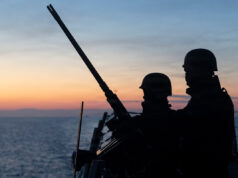
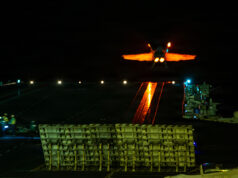

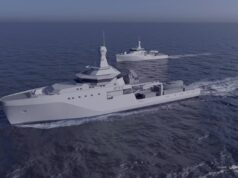
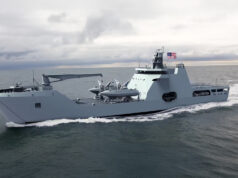
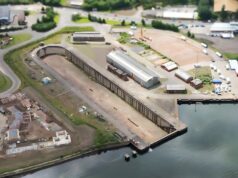
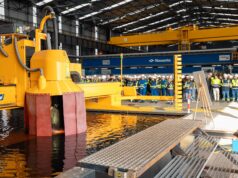
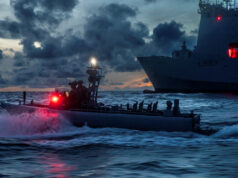

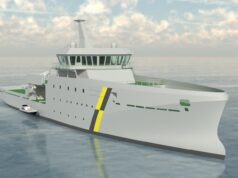

Flying the ensign covers most of that.
What are the implications though?
Some thoughts off the top of my head.
If their IFF/AIS is switched on, showing position in real time, lack of visible id will just make it harder for the French public to know what’s going on without having any effect on what the enemy knows. If they have a matching policy to switch off transponders it will make it harder for everyone to keep track, keeping the enemy guessing while reducing public accountability. However, it will also increase the chances of collisions and make it harder to hold any particular crew accountable if collisions occur. Perhaps the IFF will be switched on anonymised, so all transponders will show Jean D’eau, and it’s not like the AIS database isn’t spoofed. I expect in war or conditions of heightened tensions the transponders will be regularly switched off.
It may weaken deterrence as enemies may assume France is only hiding things because their navy is in a mess. It will be harder to hold French crews to account if the ships break laws or commit war crimes.
Jon, you don’t just rely on electronic gizmos, you have lockouts and radar, which obviously needs manning, whether military or civilian.
Collisions are somewhat rare in real terms, so when they happen they are headline news.
Fair point. I was minded of an instruction that went out in the US Navy to ensure transponders were switched on in crowded waters, ostensibly to help avoid collisions. Of course that might have been political BS following a collision. I can’t recall the circumstances.
No it’s not PBS, but visual rules wins the day regardless of what your electronic gizmos are saying. Gives the home team a warm fuzzy feeling.
Bit more difficult at night, as you are more reliant on them, but you use all your sensors to determine what you are investigating if so required. Generally you are just staying safe.
none. they’re french so insignificant. These days they limit themselves to people trafficking across the English Channel.
So how do they identify the ships of a particular class internally. There has to be some independent distinction, otherwise imagine the cock ups the MOD would be capable of.
Or is it simply a matter of not advertising their identity to the World externally.
Nonesense typical french weird thing.odd and unnecessary
The latter 👍.
It’s interesting but, what use does it really serve ? Let’s be honest it’s not going to be hard to find out which ships are in refit, which ships are tied up and which ships are deployed…it seems a bit like being opaque for the sake of being opaque…. In regards to warships, they are very much part of a nations deterrent structure and for deterrent to work best you really want to blaze it all over ( unless you have a specific operational weakness and you are trying to hide it).
I don’t see the point either Jonathan. First off, as the French Navy is so small ( like ours) a quick Google will tell you which ship of a particular class is currently in commission….
A bit different if it’s the US Navy and you have 20 of a single class, then it could be more of a head scracher….
As also said, I thought it was an internationally recognised legal requirement, to clearly identify any ship?
What are the French thinking here, too many wine and Cognac laden lunches at the French Admiralty perhaps?
I think it’s fair to say John that the “French do as the French do” and leave it at that…there are plenty of things the British do that others find a bit bizarre or realise well down the line it was a good idea…the British. Obsession with putting toilets and boiling vessels inside armoured fighting vehicles was a bit of an oddity for a long time and considered a bit “ well the British are toilet obsessed tea drinkers” but now everyone is doing it…as it cuts down casualties.
As a former Electronics Tech with the Armoured Corps, fixing crews boiling vessels was always one of the top priorities, along with the gun control equipment. Always carried at least 4 spare repair kits when on exercise.
Yup, always BV first, then gun kit👍
They are probably trying to determine which pronoun they should use for their Ships….Psychological safety and all that….
That could well be it, perhaps a Brussels Woke dictate???
Warships have always traditionally been female of course, but these days that might offend some of the ‘oh’ so very sensitive youngsters….
Britain is much more woke than France and Continental Europe. at large.
Well you would have to go some way to be ‘woker’ then some of our youngsters.
Not a priority or a concern for that matter I should think
Not something to brag about btw
Gods thats a pretty stupid take.
Gods, that’s an odd use of English, back to the St Petersburg Troll farm English classes for this one….
Wow he’s doubling down!
Hmmm, ok, welcome back John in Minsk ??
Ship names matter because vessels are crewed by people: and they are christened, like people – names are vital for all sorts of human reasons. In the case of autonomous vehicles, it doesn’t matter.
Correct. Even our tanks , ifv’s and apc’s have names though anything lighter has just an alphanumeric designation
And what prey has it got to do with a low grade politician in the opposition? That individual couldn’t tell a warship from a fishing boat.
I believe pennant numbers and so forth were painted out during the Falklands campaign, and you can see sense in that by denying the enemy easy ship recognition.
However, during peace time?
Royal Navy Submarines today don’t have pennant numbers.
Penants are flown and submarines by nature are stealth vehicles therefore it would not fall under the category as I highly doubt that the submersibles of SEAL TEAM 2 out of Hawaii have pennants that though I know for sure that they have names
How aptly French. Well it’s going to be either 1 of 4 ships in a class, so not exactly anonymous.
That’s exactly why nobody understands this decision…
In a small navy, it doesn’t really matter.
Information like this is too easy to find, even if it isn’t made public…
It’s anonymous because a Houthi rebel probably doesn’t have the knowledge to distinguish the different classes of each warship much less the nationality. Aside for the big gun or missle launcher on the fore and sometimes on the aft it’s hard to tell that it’s even a warship but for the big main command tower. For all a rebel can tell he might be attacking a “friendly “ vessel like Ivan’s or the chinks . Good move I think
Don’t think the French are going to war with anyone 🤗 🇫🇷
Tell that to the foreign legion
Alex mate, you could always run a flag from elsewhere, bit of a ruse if you will. Won’t detract from the opposition in the event of a crisis mind, flags numbers are irrelevant, you go of the silloette/ profile.
Radar profile
Sonar profile
Noise profile
Chemical profile
Electronic emissions profile
Additionally in the case of Russian aircraft carrier/submarine
Smoke profile
That is all before you break out the binos and check the pennant number.
Radar profile – no unless you have a very good radar that gives you a profile/silloette.
Sonar profile – no unless you have a TA
Noise profile – see above.
Chemical profile – not unless you are a SM with non acoustics fitted and have a really good database.
E P – yes, but has to match the silloette/profile you are expecting.
MK1 eyeball whether Bono’s or IR/TI kit usually wins the day fella.
Radar profile – no unless you have a very good radar that gives you a profile/silloette.
I think Artisan and Sampson will do that with some ease?
Sonar profile – no unless you have a TA
I was referring more to an SM
Noise profile – see above.
This was meant more about electronic noise fingerprinting which was always a UK area of excellence?
Chemical profile – not unless you are a SM with non acoustics fitted and have a really good database.
You just might be underestimating current capabilities…..
E P – yes, but has to match the silloette/profile you are expecting.
Although I did miss off EO…..
TBH fella, I’m not a radar expert, but while both Artisan and Sampson are undeniable good, they are not always turning and burning unlike the ships nav radar which is – where I was coming from.
SMs, a totally different ballgame, acoustic signature whilst submerged, or, visual/EM signature if surfaced.
Chemical profiling is an absolute nightmare, basically its either nuclear or not. Any database in this area is very unreliable, too many variables which can fit anything.
Whichever way you attack this, unless you get a positive electronic/acoustic fingerprint, you are reliant on visual ID.
So F123456789 tells you what about the ship nationality
Not a good move. The forces and the names of equipment should be named in such a way that they become common around the public which helps keep forces in people’s minds when the poop isn’t hitting the fan.
Removing names is silly.
Ask people to name a ship and most will be able to.
Names are important, removing the name will do little to effect any adversary but will effect the general public.
But they always have a name.
They are only made anonymous for deployment.
So if they do this with the navy…will they remove serial numbers from aircraft or TRF from uniforms of army units?? And if not, why one but not the others?
This makes no sense to me.
One of the main reasons is officially to create a certain vagueness around ships and crews, which makes espionage more difficult, in particular by making it more difficult to collect data on ships and crew members.
Unfortunately Hermes it won’t achieve that, a simple quick Google and a 6 year old could tell you what ship it is within 30 seconds!
That principle only works with large Navies. It’s a rather silly and quite odd thing to do….
The foreign legion technically is independent of the government though we all know better. It’s a more streamlined and obedient version of Wagner
It won’t matter when the ships are sailing in darkness.
Don’t Russian warships have different numbers displayed if they change location?
The US have unique Hull numbers, rather than the random pennants we use.
(R05-R09 have been reused since the 60s)
I suspect this will cause more annoyance to France’s allies than it’s enemies. Pointless exercise. Very French.
Hey our ancestors thought that foreplay was useless and pointless too . Now look at where we stand on this. God bless the French I say!
😂